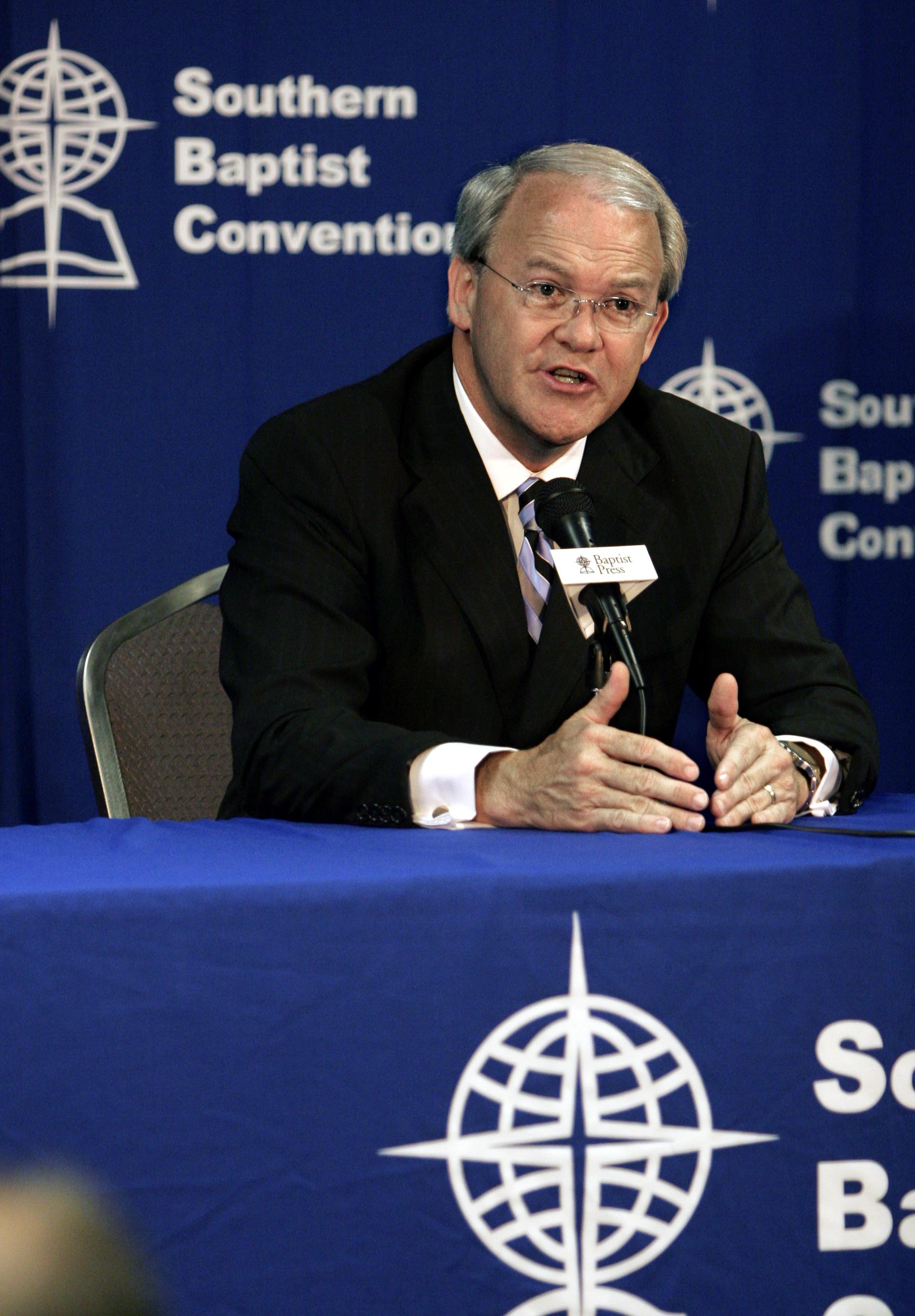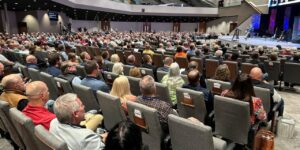
SAN ANTONIO (BP)—”I’m trying hard to present the very wonderful message of our Lord Jesus Christ and his transforming power in church families and individual lives,” Frank Page declared after being re-elected by acclamation as Southern Baptist Convention president June 12 in San Antonio.
Fielding reporters’ questions after the election, Page described his first year in office by saying: “I desperately wanted to do a better job of communicating what Southern Baptists stood for, not just what we stood against.”
Commending the generous response of volunteers deployed to areas affected by Hurricanes Katrina and Rita, Page pointed out that Southern Baptists are responsible for the third-largest disaster relief operation in the United States.
“People must see that we care,” said Page, pastor of First Baptist Church in Taylors, S.C. “Just go to New Orleans now and talk to people of every religion and ask them who’s doing something there that makes a difference.”
Offering a long list of examples of ministry by local churches as well as efforts funded by the Cooperative Program, Southern Baptists’ channel for funding missions, Page said the image people might have of Southern Baptists is off-target.
“I’m not trying to pat ourselves on the back, but I’m saying we have been characterized by a kind of persona by our world that is not accurate,” Page said. “The truth is millions of Southern Baptists will do anything in the world they can to help people.”
While Page fielded reporters’ questions for a half-hour and emphasized spiritual renewal, discipleship, evangelistic outreach and multi-generational ministry, various SBC issues nevertheless were raised.
On whether calls to confine policies to the parameters of the SBC’s doctrinal statement were distinct from the conservative-moderate debates of several decades earlier, Page told reporters many people are saying, “The pendulum has swung far enough.”
“At one time the Baptist Faith and Message was regarded as an extreme document by some,” Page said of the 2000 revision to the doctrinal statement. “Now it’s almost like it’s being seen as a more moderating influence and that many want to go beyond it.” He reiterated a conviction he shared after his election last year, stating, “I do believe we’ve gone far enough and that the Baptist Faith and Message is enough and I encourage entities not to go beyond that in their doctrinal parameters.”
Citing “various secondary and tertiary issues that are still within the framework of inerrantism or extreme conservative viewpoint,” Page characterized recent debate over the legitimacy of a private prayer language as another example of a distraction from an evangelistic focus.
“We can discuss things. We can have different opinions, but the issues we’ve discussed already are certainly not primary when compared to winning this world to Christ [and to] minister to men, women, boys and girls,” Page said. “Good dialogue and debate can come forward, but they pale in comparison to issues I’m trying to keep as the central focus.”
The South Carolina pastor said he was not surprised by a recent LifeWay Research study that revealed half of Southern Baptist pastors polled believe it is possible for God to give Christians a private prayer language.
“It shows there are various ways to interpret Scripture in regard to that issue. That’s why I think it’s important Baptists not take a stand that would alienate a large part — possibly half — of the people,” Page continued. “Whatever stand you take, you’ve alienated the other half of the people.”
If such discussion was over a primary issue, Page said, “We would do what’s right whether we alienate people or not.”
Asked if the BF&M should constrain trustee boards from making doctrinal policies that exceed the SBC statement of beliefs, Page insisted: “No, that’s not what I’m saying. I said in doctrinal parameters I think we should be careful in going past that. We do respect the trustee system. I simply said I urged them not to go beyond doctrinal parameters. There are multitudes of issues that trustees have to deal with regarding personnel, regarding issues of all kinds that may not be directly doctrinal.”
Stating his agreement with Southwestern Baptist Theological Seminary President Paige Patterson’s statement that one who claims a private prayer language should be satisfied to keep it private, Page said, however, he disagreed with the new policy adopted by seminary trustees last fall that disqualifies professors who advocate that and other charismatic practices.
“Again, I personally would rather they not have done that.” Adding that Southwestern’s trustees are aware of his opinion, Page said, “We just have to agree to disagree on that.”
Page said although he was surprised to be elected last year in Greensboro, N.C., he feels he has kept his pledge to involve a number of Southern Baptists on decision-making boards and committees who had not been previously been a part of the process.
Ninety-five percent of his appointments were individuals who had never been involved previously, Page said, a pattern he credited his predecessor, Bobby Welch of Florida, with establishing.
The ages of Page’s appointments ranged from 27 to 80, with members primarily coming from small- to medium-sized churches. He further stated that he had intentionally involved individuals representing both conventions in the states of Texas and Virginia where two state bodies are recognized by the SBC.
“I made it very clear from the beginning that if I could find persons meeting the criteria, I stated that I would not arbitrarily exclude any cooperating Baptist convention,” Page said.
Last year Page specified that his criteria for appointments would require “a sweet spirit, an evangelist’s heart,” and a commitment to biblical inerrancy. “I’ve kept my word and worked hard to try to help people feel included instead of excluding them.”
Page said he has tried to be “irenic” and “kind” and will continue to do so, but not at the expense of theological concerns.
“I am in no way trying to undo what some have called a Conservative Resurgence and others by other names,” Page said. “I have said many times I believe the Bible, I’m just not angry about it. I stand by that and have stayed with that, though some have not appreciated it.”
Asked if he felt the lack of a challenge to his candidacy indicates acceptance by those who opposed him last year, Page said he believes “there was probably a calculated analysis” as to whether to oppose an incumbent — an unusual practice — “and it was decided it was probably best not to do that.”
In describing his focus as president, Page said, “I am calling on people to beg God for spiritual renewal and revival.”
“We will not increase baptisms until we are right with the Lord,” Page said, citing Psalm 51:1-12.
Asked about the morality of the relatively new practice of blogging by various Southern Baptists, Page remained focused on righteous behavior. “I don’t care what arena you’re using or the communications mode you’re involved in, we must be careful to apply biblical standards to try to talk to each other.”
Page agreed with a call to show greater care in evangelizing with integrity. “By that I mean those we do win to Christ, seek to disciple them. Make sure their decisions were truly heartfelt and not simply transitory or shallow,” he said. “I do not think there is too much emphasis on numbers. We must couple it with a serious call to discipleship.”
Regarding one messenger’s appeal for a database to report sex offenders, Page said an SBC entity already is considering ways to help local churches avoid such immoral behavior. “We believe in the autonomy of the local church,” he stated, insisting, “Churches must step up to the plate to help protect precious children and we’ll do whatever we can to help them.”
Page spoke of the opportunity to interact with secular politicians as the most surprising opportunity afforded to him as SBC president. He mentioned conversations with Republican presidential contenders Mike Huckabee, John McCain and Rudy Guliani, as well as former Presidents Jimmy Carter and Bill Clinton and former Democratic nominee John Kerry. Page said he plans to meet candidate Mitt Romney and others.
“Most of that’s been pretty positive,” Page said.
Giving scant details of a 10-year multifaceted and flexible evangelistic strategy to be announced by the North American Mission Board as a means of better equipping local churches in sharing the Gospel message, Page said he believes the idea is timely.
In the world at large, Page expressed concern at the increasing secularization of society “and what we might call aggressive atheism.” While he has found individuals “quite open to discuss the Gospel,” Page said, “society as a whole is increasingly antagonistic.”
–30–
Jerry Pierce contributed to this story.















